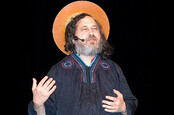This article is more than 1 year old
Open source turns 20 years old, looks to attract normal people
Who knew sharing would transform an industry?
The color of money
Beyond the need for diversity, Perens foresees legal challenges. "A lot of the law around our licenses is still cloudy," he said. "A lot of it has never been litigated. And standards are an area where we're seeing some [patent royalty] pressure right now."

Stallman's GNU at 30: The hippie OS that foresaw the rise of Apple - and is now trying to take it on
READ MOREThen there's the issue of corporations coopting the movement, loading up outfits like the Linux Foundation with company reps.
"Part of the problem we're having is we shifted from having open source organizations speak for open source to having organizations like the Linux Foundation," he said. "If you look at the controlling board of the Linux Foundation, I don't think they're interested in reforming patents, even if that benefits open source software. They're the companies that benefit from software patenting."
Burke contends that there's always been a tension between individuals and companies in the open source community. Even 15 year ago, he said, the vast majority of contributors to Linux were paid and sponsored by corporations. "That dynamic has always been there," he said.
Perens said he was particularly concerned about the Linux Foundation, referring to the organization, as he has previously, as "loggers who say they speak for the trees." Its board, he said, is entirely made of big companies, and it lobbies legislators and provides speakers at events with messaging that advances its members' interests rather than those of the open source community.
Heartbroken
He also pointed to the trademark conflict between the Software Freedom Law Center and the Software Freedom Conservancy as a source of distress. "I'm really very shocked at [SFLC executive director] Eben Moglen, but obviously the SFLC is supported by the Linux Foundation and I see them having a role in that conflict. A lot of people in the open source free software community are really heartbroken about what Eben's doing right now, because he was a friend, a friend for decades, and we don't understand."
And Perens expressed doubts about the Open Innovation Network, ostensibly a defensive patent pool to protect Linux from patent claims. "The big question I have is does Open Innovation Network exist to protect open source from software patenting or to protect software patenting from open source?"
Perens argues that the activities of the Open Innovation Network and the Linux Foundation have actually worked against patent reform.
"As the Linux Foundation sort of moves further and further toward the right, which we're seeing now with VMware on the steering board, it's sort of operating like a Linux infringers organization," he said. "Those things worry me. And the campaign against GPL enforcement coming from the Software Freedom Law Center seems like it's motivated by that."
The challenge for the open source community is not only bringing more people in, but preventing people from pulling it apart. ®
